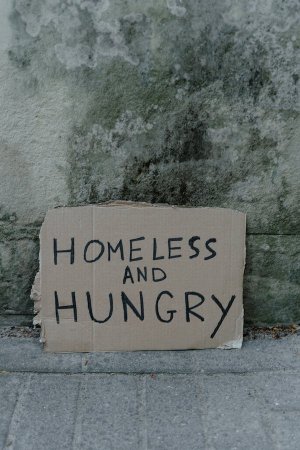Is Australia forcing welfare recipients to beg for assistance?
- Replies 24
Services such as Centrelink from the government are crucial, especially with the soaring cost of living and the many day-to-day hardships more than 3 million Aussies living under the poverty line face.
But some observe that welfare recipients are repeatedly being made to relive and disclose their personal hardships as a requirement to access aid.
In a piece on The Conversation, Emma Mitchell, a postdoctoral research fellow at Western Sydney University and author of Making Life On Mean Welfare: Voices From Multicultural Sydney, shared the idea of ‘performing vulnerability’ as a key concept in action between the government and welfare recipients.
‘It’s not just about repeatedly describing personal hardship,’ she said.
‘It points to the expectation to describe hardship in particular ways that are recognisable — and hence believable — to support providers.’
Mitchell points out that the government’s welfare system requires recipients to be present in many training courses and programs ‘simply to receive their payments’.

Her book expounds on how performing vulnerability exacerbates disadvantages in the long run.
‘It does so by fostering mistrust between welfare users and providers, as well as tainting how people in need of support see themselves and their situation.’ she said.
Mitchell admits the focus of her piece is not an unfamiliar topic.
‘I know all too well what it is like to ask people to tell their stories of hardship yet again.’ she shared.
‘I also grew up in an impoverished family reliant on welfare to get by. I know firsthand what the impact of retelling stories of hardship can be, particularly when the audience is, as (academic Mark Peel) puts it, “someone who has the power to give or deny them something they need”.’
For her research, Mitchell scoured Sydney to talk with welfare workers and recipients to hear and understand their experiences.
One community welfare worker understood her point and offered their take.
‘(They) summed it up by saying: “They’re coming again feeling ashamed. They’ve knocked on someone’s door, to tell yet again how s***ty their situation is.”’
The worker said in response, they developed a tactic where they would lead their conversations with aid recipients by asking ‘Can you tell me your story?’
Afterwards, they would then say as a follow-up: ‘You’ve given me some insight, let’s formalise your story a little bit.’
Mitchell also recalled speaking to another worker who encountered an individual unwilling to share a bit more information to qualify for financial assistance.
‘That person doesn’t want to take responsibility,’ she remembered hearing from the worker.
In another instance, a third welfare worker expressed how sceptical they were of the recipient they interviewed.

The worker felt that the recipient ‘dramatised (their) situation’, but also stressed that it didn’t mean the recipient wasn’t ‘genuine’.
Mitchell’s encounters with the workers (and their interactions with welfare recipients) led her to a conclusion.
‘The willingness of people seeking assistance to disclose personal hardships and do so convincingly impacts on how deserving they may come across to those delivering support.’ she said.
‘The pressure to perform can overshadow encounters between welfare users and workers even when it doesn’t determine the outcome.’
On the other end, Mitchell also discovered the cost of recipients having to reveal personal hardships again and again to agencies.
Two women named Kane and Nessa (names changed, according to Mitchell) shared their experiences.
‘Often if you go to them [sic] sorts of people (welfare agencies) you’ve gotta put it all out there, that you’re homeless, that you got nothing, you got no friends, no family – and then they’re gonna go boom “alright” (you get the help you came for)…’ Kane said.
‘You gotta go down to those levels you know – it’s wrong.’
Nessa agreed: ‘Yeah, that’s what I had to do to get a house and it’s embarrassing.’
‘When you gotta expose everything and don’t want to, it’s, like, your dignity.’

For Mitchell, when it comes to the stories people are willing to part with when they seek welfare assistance, it is important to take note that the act of emphasising your struggles to get much-needed financial help is not the same as faking one’s circumstances — especially when the system it occurs in reinforces performing vulnerability.
‘The most marginal welfare users get a great deal of practice performing their hardship. But knowing how to tell their story a certain way is not the same as pretending.’ she underscored.
‘Not only do people at the sharp end of the welfare system have to endure the hardships of poverty, but they must then recite it in a way that registers as genuine, pressing and beyond reprieve.’
‘A welfare system that demands disclosure of personal hardships — even when geared towards being supportive rather than suspicious — can undermine dignity and hold back those unwilling or unable to tell their story convincingly or in enough detail.’

Resting her case, Mitchell shared the thoughts of one disability support pension recipient she interviewed: ‘You don’t have the flexibility that a rich person has to respond to crisis, so you have to beg for help. That takes time!’
‘And you know you’ll be judged like it’s your fault.’
What do you think of Mitchell’s observations? Do you agree that the way our government welfare system is set up can have the consequence of cutting off people who aren’t willing or unable to properly disclose their situations from aid?
Tell us your thoughts and opinions below!
But some observe that welfare recipients are repeatedly being made to relive and disclose their personal hardships as a requirement to access aid.
In a piece on The Conversation, Emma Mitchell, a postdoctoral research fellow at Western Sydney University and author of Making Life On Mean Welfare: Voices From Multicultural Sydney, shared the idea of ‘performing vulnerability’ as a key concept in action between the government and welfare recipients.
‘It’s not just about repeatedly describing personal hardship,’ she said.
‘It points to the expectation to describe hardship in particular ways that are recognisable — and hence believable — to support providers.’
Mitchell points out that the government’s welfare system requires recipients to be present in many training courses and programs ‘simply to receive their payments’.

Emma Mitchell says ‘performing vulnerability’ is a concept at play in the government’s distribution of welfare to those in need. Credit: Pexels/MART PRODUCTION
Her book expounds on how performing vulnerability exacerbates disadvantages in the long run.
‘It does so by fostering mistrust between welfare users and providers, as well as tainting how people in need of support see themselves and their situation.’ she said.
Mitchell admits the focus of her piece is not an unfamiliar topic.
‘I know all too well what it is like to ask people to tell their stories of hardship yet again.’ she shared.
‘I also grew up in an impoverished family reliant on welfare to get by. I know firsthand what the impact of retelling stories of hardship can be, particularly when the audience is, as (academic Mark Peel) puts it, “someone who has the power to give or deny them something they need”.’
For her research, Mitchell scoured Sydney to talk with welfare workers and recipients to hear and understand their experiences.
One community welfare worker understood her point and offered their take.
‘(They) summed it up by saying: “They’re coming again feeling ashamed. They’ve knocked on someone’s door, to tell yet again how s***ty their situation is.”’
The worker said in response, they developed a tactic where they would lead their conversations with aid recipients by asking ‘Can you tell me your story?’
Afterwards, they would then say as a follow-up: ‘You’ve given me some insight, let’s formalise your story a little bit.’
Mitchell also recalled speaking to another worker who encountered an individual unwilling to share a bit more information to qualify for financial assistance.
‘That person doesn’t want to take responsibility,’ she remembered hearing from the worker.
In another instance, a third welfare worker expressed how sceptical they were of the recipient they interviewed.

How much of your story are you willing to share in exchange for help? Credit: Pexels/MART PRODUCTION
The worker felt that the recipient ‘dramatised (their) situation’, but also stressed that it didn’t mean the recipient wasn’t ‘genuine’.
Mitchell’s encounters with the workers (and their interactions with welfare recipients) led her to a conclusion.
‘The willingness of people seeking assistance to disclose personal hardships and do so convincingly impacts on how deserving they may come across to those delivering support.’ she said.
‘The pressure to perform can overshadow encounters between welfare users and workers even when it doesn’t determine the outcome.’
On the other end, Mitchell also discovered the cost of recipients having to reveal personal hardships again and again to agencies.
Two women named Kane and Nessa (names changed, according to Mitchell) shared their experiences.
‘Often if you go to them [sic] sorts of people (welfare agencies) you’ve gotta put it all out there, that you’re homeless, that you got nothing, you got no friends, no family – and then they’re gonna go boom “alright” (you get the help you came for)…’ Kane said.
‘You gotta go down to those levels you know – it’s wrong.’
Nessa agreed: ‘Yeah, that’s what I had to do to get a house and it’s embarrassing.’
‘When you gotta expose everything and don’t want to, it’s, like, your dignity.’

Mitchell says how much welfare recipients are willing to disclose details of their hardships and if they can do so convincingly impacts the outcome of their access to welfare. Credit: Pexels/Timur Weber
For Mitchell, when it comes to the stories people are willing to part with when they seek welfare assistance, it is important to take note that the act of emphasising your struggles to get much-needed financial help is not the same as faking one’s circumstances — especially when the system it occurs in reinforces performing vulnerability.
‘The most marginal welfare users get a great deal of practice performing their hardship. But knowing how to tell their story a certain way is not the same as pretending.’ she underscored.
‘Not only do people at the sharp end of the welfare system have to endure the hardships of poverty, but they must then recite it in a way that registers as genuine, pressing and beyond reprieve.’
‘A welfare system that demands disclosure of personal hardships — even when geared towards being supportive rather than suspicious — can undermine dignity and hold back those unwilling or unable to tell their story convincingly or in enough detail.’
Key Takeaways
- The welfare system in Australia often requires applicants to repeatedly disclose their personal hardships in order to receive support.
- This can compound the cycle of disadvantage associated with receiving welfare in the long term, according to one expert.
- The expectation to perform vulnerability can foster mistrust between welfare users and providers, as well as taint how people in need of support see themselves and their situation.
‘And you know you’ll be judged like it’s your fault.’
What do you think of Mitchell’s observations? Do you agree that the way our government welfare system is set up can have the consequence of cutting off people who aren’t willing or unable to properly disclose their situations from aid?
Tell us your thoughts and opinions below!







